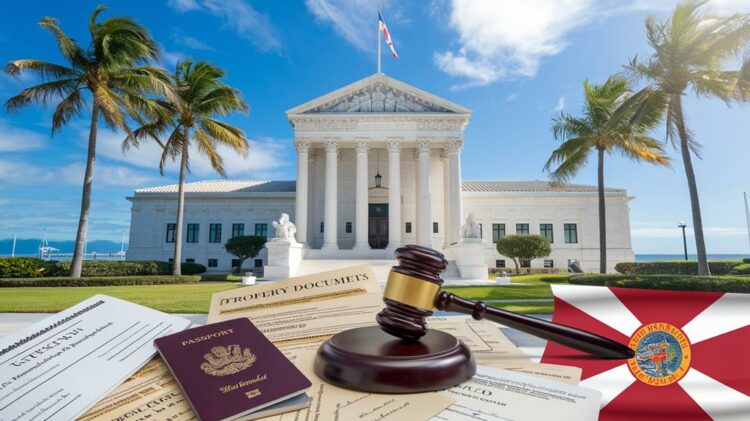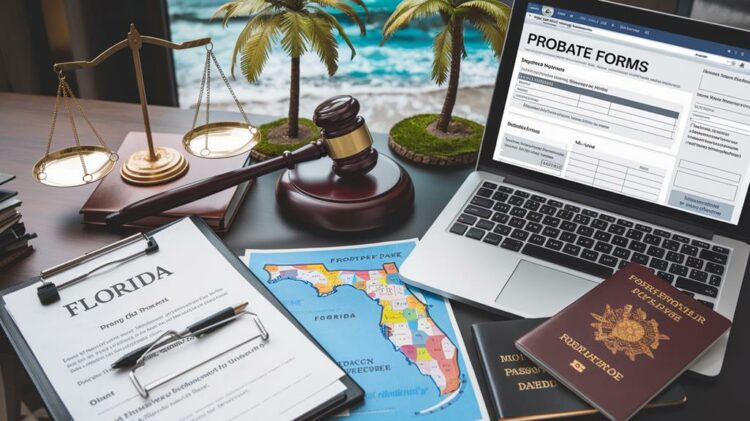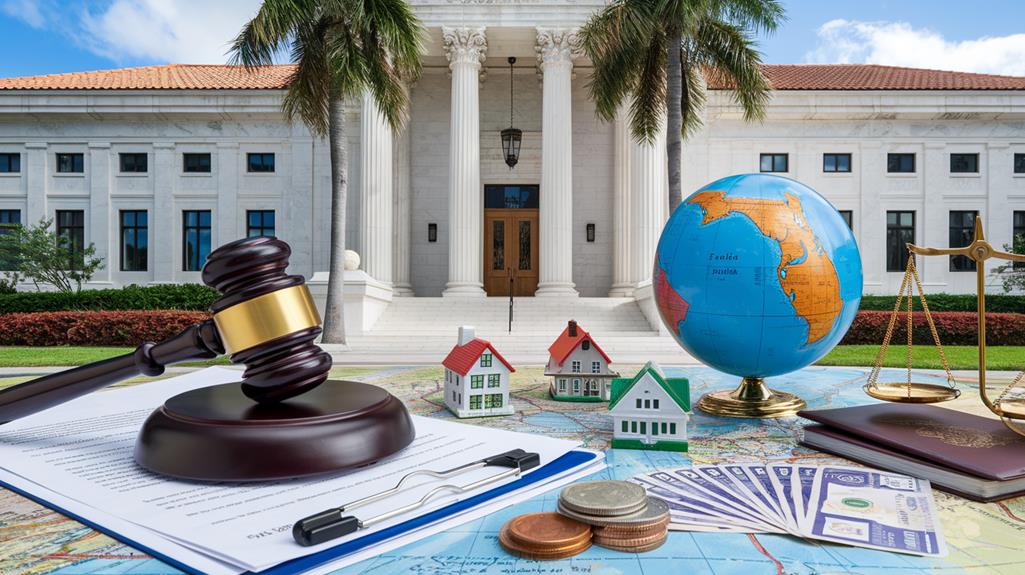If you’re not from Florida but own a house there, there’s something called ancillary probate you should know about. It’s a special process that happens when someone who doesn’t live in Florida passes away and leaves property behind.
Ancillary probate is different from regular probate. It involves extra steps, like choosing someone to take care of the Florida property. This person is called a personal representative.
For people who live in Florida but aren’t U.S. citizens, the process is the same as it is for citizens. But for those who live outside Florida, it can be more complicated.
It’s a good idea to ask a lawyer who knows about foreign probate for help. They can explain how long it might take and what you need to do. Understanding these things can make it easier to pass on your Florida property to your family when the time comes.
Key Takeaways
- When someone who doesn’t live in Florida owns property there and passes away, their family needs to go through a special process called ancillary probate. This helps manage the property left behind in Florida.
- Ancillary probate is different from regular probate and can be a bit trickier. It involves choosing someone to take care of the Florida property. How long it takes and how complicated it is depends on things like how much the property is worth and if there’s a will.
- If the property is worth more than $50,000, the family needs to do something called formal ancillary administration. For property worth $50,000 or less, there’s an easier process called summary administration.
- Because ancillary probate can be confusing, it’s a good idea for families to talk to a lawyer who knows a lot about Florida’s rules. This helps make sure everything is done right and protects the property left behind.
Understanding Foreign National Classification
When someone from another country comes to live in the United States, they’re called a foreign national. These people can be put into two groups: resident aliens and nonresident aliens.
Resident aliens are like U.S. citizens in many ways. They have a special card called a green card or have lived in the U.S. for a long time. They have similar rights and duties when it comes to dealing with a person’s belongings after they die.
Nonresident aliens are different. They might be students from other countries or people working in the U.S. for a short time. When someone in their family dies, they might face more challenges in dealing with the person’s stuff.
It’s important to know which group a foreign national belongs to. This helps everyone understand what rules to follow when sorting out a dead person’s belongings and money.
Probate for Resident Vs. Nonresident Aliens
When someone who isn’t a U.S. citizen dies, their belongings need to be taken care of. This process is called probate. It’s different for people who lived in the U.S. (resident aliens) and those who didn’t (nonresident aliens).
For resident aliens, the process is the same as for U.S. citizens. A person is chosen to handle everything, including any houses or land in Florida.
For nonresident aliens, it’s a bit more complicated. They need something called ancillary probate. This means someone from their home country has to be picked to take care of their stuff in Florida.
This person has to ask a Florida court for permission to handle things. They need to show papers proving they’re allowed to do this job. It can be tricky, so they often need help from a lawyer who knows about these special cases.
The main goal is to make sure everything is done properly and fairly. This way, the person’s wishes are followed, and their Florida property goes to the right people according to the law.
 Florida Ancillary Probate Process for Nonresidents
Florida Ancillary Probate Process for Nonresidents
When someone who doesn’t live in Florida passes away but owns property there, their family needs to go through a special process called ancillary probate. This is different from regular probate and involves asking a local court for permission to handle the person’s belongings in Florida.
This process isn’t just for people from other countries. It also applies to Americans who live in other states. If the person owned things in multiple places, it can get tricky because each state has its own rules.
The court helps oversee how the person’s Florida property is collected, managed, and given to their family members. It’s important for families to work with lawyers who understand these rules to make sure everything goes smoothly.
For people who own property in Florida but live elsewhere, it’s really important to understand how ancillary probate works. This knowledge can help protect their property and make things easier for their family in the future.
Probate Complexities for Resident Aliens
When someone who isn’t a U.S. citizen but lives in Florida passes away, dealing with their belongings can be tricky. This is called probate, and it’s extra complicated for resident aliens.
Resident aliens are people who live in America but aren’t citizens yet. They have special cards that let them stay. When a resident alien dies and owned a house in Florida, their family has to follow special rules to handle their stuff.
One big challenge is something called Florida Ancillary Probate. This happens when the person who died didn’t live in Florida but owned property there. It means extra paperwork and can take more time and money.
There are other things to think about too. The family might have trouble moving the house to a new owner. They also need to understand taxes and might need to hire a lawyer who knows about probate.
It’s important for resident aliens to keep their papers in order. This helps make things easier if something happens. Getting help from lawyers who know about these special cases can make the whole process smoother.
Hiring an Attorney Specializing in Foreign Probate
When someone from another country owns stuff in Florida but dies while living somewhere else, it can get tricky to deal with their property. That’s where special lawyers come in handy. These lawyers know all about Florida’s rules for handling property left behind by people who lived in other places.
These lawyers are experts at helping families sort out complicated situations. They can work with courts in different countries to make sure everything is done right. They also help prevent paying too much in taxes and protect the things the person owned in Florida.
These special lawyers understand how to handle the process of transferring ownership of houses, land, or other valuable items in Florida. They guide families through all the steps, making it easier to get everything sorted out properly.
Ancillary Probate Basics and Requirements
When someone who doesn’t live in Florida dies and owns property there, a special process called ancillary probate takes place. This helps transfer the Florida property to the right people, like family members or friends mentioned in a will.
A person called a personal representative is chosen to handle this process in Florida. They work on the ancillary probate while the main probate happens in the state where the person lived.
How long ancillary probate takes and how complicated it is depends on things like how much the property is worth and if the person had a will. The personal representative has to follow specific rules in Florida to make sure everything is done correctly.
It’s important for people who don’t live in Florida but own property there to understand ancillary probate. This way, they can make sure their property is taken care of properly after they’re gone.
 Formal Vs. Summary Ancillary Administration
Formal Vs. Summary Ancillary Administration
When someone dies and owns property in Florida, there are different ways to handle their estate. If the property is worth more than $50,000, a process called formal ancillary administration is needed. This is a bigger, more detailed process that the court watches closely.
For property worth $50,000 or less, there’s a simpler way called summary ancillary administration. It’s quicker and doesn’t need as much court involvement.
In formal ancillary administration, a special person called a Florida ancillary personal representative is chosen to take care of the estate. This process can take longer because there are more legal steps to follow, and sometimes people might disagree about what should happen.
The type of administration used depends on how much the Florida property is worth and if a full probate process is necessary. Probate is the legal way of sorting out someone’s belongings after they die.
If the property in Florida is worth less than $50,000, summary ancillary administration is usually the best choice. It’s faster and costs less money, which is helpful for people who live outside Florida but owned property there.
Factors Impacting Ancillary Probate Duration
Ancillary probate in Florida can take different amounts of time depending on a few things. Let’s look at what can make it faster or slower:
When someone dies and leaves property in Florida, their family might need to go through ancillary probate. This is a legal process to handle the property left behind.
If the estate is simple and doesn’t have too many assets, it might go faster. But if there’s a lot of property or complicated things like businesses, it can take longer.
The value of the property matters too. If it’s worth less than $50,000, there’s a quicker way to handle it called summary administration.
Sometimes, family members might disagree about who gets what. This can make the process take much longer and cost more money.
If people involved in the process live outside of Florida, it can actually help things move faster. They don’t always need to come to Florida for court.
Getting help from a Florida probate lawyer can make things easier. They know the rules and can help finish the process more quickly.
Frequently Asked Questions
Does Florida Require Ancillary Probate?
Florida has a rule called ancillary probate for people who don’t live there but own things in the state. When someone who lives elsewhere dies but owned stuff in Florida, the state’s courts handle those things. This helps make sure the right people get the items left behind. It’s important because Florida wants everything done correctly and fairly.
In Which of the Following Situations Is Ancillary Probate Necessary?
Ancillary probate happens when someone dies and owns property in different places. For example, if your aunt lived in New York but had a vacation house in Florida. When she dies, her family might need to do ancillary probate in Florida. This makes sure everything follows the rules in both states and helps decide who gets the property.
Which of the Following Techniques Can Be Used to Avoid Ancillary Probate?
There are ways to avoid ancillary probate:
- Make a “revocable living trust”
- Share ownership with someone else
- Use a “transfer-on-death deed”
- Give away property while you’re alive
- Put property in a company you own
These methods help make sure your things go to the right people easily.
How Much Does Ancillary Probate Cost in Florida?
Ancillary probate in Florida can cost between $3,000 and $10,000 or more. The price depends on how complex the case is. Costs include lawyer fees, court filing fees, and other small expenses. Each case is different, so the exact amount can vary a lot.
Conclusion
Ancillary probate in Florida can be tricky, especially for people who own property there but live in other countries. There are different rules for different kinds of foreign property owners, and the process can change based on your situation. It’s important to know which group you belong to and understand all the laws and steps involved. This can be confusing, but don’t worry – help is available!
If you’re dealing with ancillary probate in Florida, Real Estate Law FL is here to guide you. Our team knows all about foreign probate and can help make the process smoother for you. We’ll explain your options, like formal or summary probate, and help you choose the best path. Don’t try to handle this complicated process alone. Visit Real Estate Law FL to learn more about how we can help. You can also email us or call us to get started on your ancillary probate case today.

